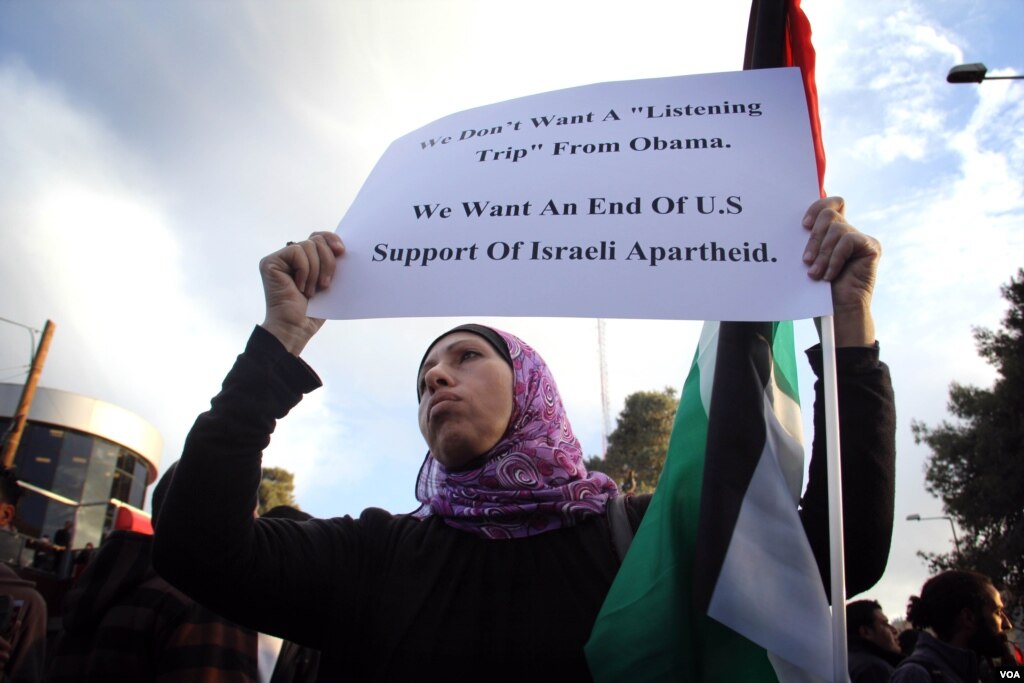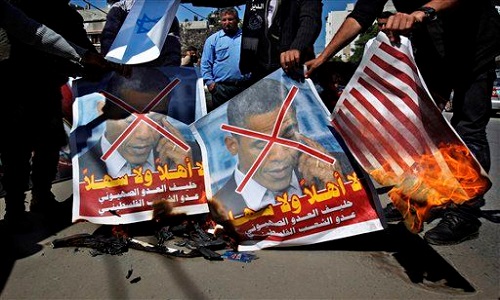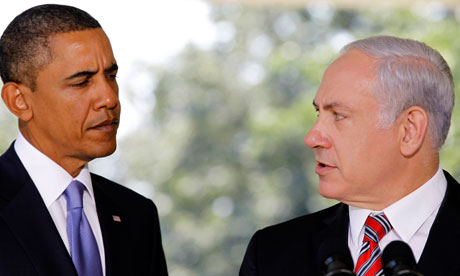PNA sidesteps the US, US moves to block them

A Palestinian woman holds up a sign, March 19th, 2013, protesting against President Obama’s visit to the West Bank.
Although US/ Palestinian relations improved during John Kerry’s attempts to restart negotiations, popular hostility towards Obama for the failure to follow up his critical words about settlements with any action remained high. US efforts to block the bid for Palestinian statehood and for an ICC prosecution of war crimes has made relations even worse at all levels. Photo by R. Collard / VOA.
US slams ICC over war crimes probe of Israel
State Department ‘strongly disagrees’ with prosecutor’s action, says it is ‘tragic irony that Israel, which has withstood thousands of terrorist rockets fired at its civilians, is now being scrutinized by the ICC.’
By Yitzhak Benhorin, Reuters, AP, Ynet news
January 17, 2015
The US State Department late on Friday condemned the International Criminal Court’s decision to open a preliminary probe into possible war crimes in Palestinian territories, calling it a “tragic irony.”
“We strongly disagree with the ICC Prosecutor’s action today. As we have said repeatedly, we do not believe that Palestine is a state and therefore we do not believe that it is eligible to join the ICC,” State Department spokesman Jeff Rathke said in a statement.
The International Criminal Court on Friday launched an inquiry into possible war crimes in the Palestinian territories, opening a path to possible charges against Israelis or Palestinians.
“It is a tragic irony that Israel, which has withstood thousands of terrorist rockets fired at its civilians and its neighbourhoods, is now being scrutinized by the ICC,” Rathke further said.
“The place to resolve the differences between the parties is through direct negotiations, not unilateral actions by either side. We will continue to oppose actions against Israel at the ICC as counterproductive to the cause of peace,” he added.
Also blasting the move, Foreign Minister Avigdor Lieberman said on Friday the ICC’s scandalous decision was intended to hurt Israel’s right to defend itself from terror. “The same court which – with more than 200,000 dead in Syria – has not found cause to intervene there, or in Libya, or in other places, finds it appropriate to ‘examine’ the most moral military in the world, in a decision based entirely on anti-Israeli political considerations.”
UN Secretary-General Ban Ki-moon has confirmed the Palestinians – whose peace talks with Israel have collapsed – will formally become an ICC member on April 1 at their request, a move strongly opposed by Israel and the United States.
On January 1, a day before requesting ICC membership, the Palestinian government asked the prosecutors to investigate alleged crimes committed on its territory since June 13, 2014, the day three Israeli teens were kidnapped and murdered in the West Bank, leading Israel to launch a military operation in Palestinian territories.
“The office will conduct its analysis in full independence and impartiality,” said the prosecution office in a statement, adding that it was a matter of “policy and practice” to open a preliminary examination after receiving such a referral.

“The case is now in the hands of the court,” said Nabil Abuznaid [above], head of the Palestinian delegation in The Hague. “It is a legal matter now and we have faith in the court system.”
Official sources in Jerusalem said “Israel categorically denies the announcement by the prosecutor on the opening of a preliminary examination based on the scandalous request by the Palestinian Authority.”
“The PA is not a country and thus there is no cause for the court, even accords to its rules, to undertake such an inquiry. The decision is absurd, even more so given that the PA cooperates with terror organization Hamas, which commits war crimes against Israel – who is fighting terror,” added the sources.
Palestinian Foreign Minister Riad Malki welcomed the move and said the Palestinian Authority would co-operate.
“The Palestinian people called upon us to go to court and ask for an investigation and therefore we consider the announcement today as a historic event,” he said.
As explained by Ynet earlier in the week, the investigation of senior Israeli officials remains far in the future, if it ever occurs. The ICC is currently conducting eight preliminary examinations – in Afghanistan, Colombia, Georgia, Guinea, Honduras, Iraq, Nigeria, and Ukraine.
In the Georgian case, ICC officials have been mulling an investigation for seven years; in Ukraine, eight months have passed without a clear decision by the court.
A preliminary examination, which could take many years, involves prosecutors assessing the strength of evidence of alleged crimes, whether the court has jurisdiction and how the “interests of justice” would best be served.
Only if that led to a full investigation could charges be brought against officials on either the Israeli or Palestinian side of the conflict. An initial inquiry could lead to war crimes charges against Israel, whether relating to last conflict in Gaza or Israel’s 47-year-long occupation of the West Bank and Gaza Strip.
It also exposes the Palestinians to prosecution, possibly for rocket attacks by militant groups operating out of Gaza.

Palestinian negotiator Saeb Erekat enjoying good relations with then-Secretary of State John Kerry, Ramallah, June 2013. But US policy is not determined by good -or bad – relations between the negotiators.
A crisis in U.S.-Palestinian ties
Unlike the United States’ harmless verbal attacks against Israel, its hostile actions against the Palestinians comprise a strategic threat, spawning an ever-low point in their relationship.
By Aaron Magid, Haaretz
January 20, 2015
JERICHO, WEST BANK – In a widely publicized column, The Atlantic columnist Jeffery Goldberg wrote in October “The Crisis in U.S.-Israeli Relations is Officially Here.” Most notably, an unnamed senior Obama Administration official described Netanyahu as a “chickenshit.” Yet, the events of the past weeks at the United Nations Security Council and growing U.S. threats of cutting aid after the Palestinians signed papers to join the International Criminal Court in The Hague demonstrate that U.S.-Israeli relations remain relatively strong while U.S.-Palestinian ties may have sunk to their lowest levels.
U.S.-Palestinian friction was not always the norm. As recently as the summer of 2013, U.S. Secretary of State John Kerry praised Palestinian President Mahmoud Abbas for taking political risks in resuming bilateral negotiations with Israel. Kerry also announced a $4 billion investment plan to improve the Palestinian economy.
Only this past month did ties suffer dramatically. First came the Palestinian resolution for statehood at the United Nations Security Council. Since the summer’s Gaza War, this was the Palestinian’s most critical diplomatic initiative. Washington adamantly opposed it.
In an interview at his Jericho office, Chief Palestinian Negotiator Saeb Erekat expressed frustration with the U.S. position. “They refused to work with us on the UNSC draft,” Erekat told me. Refuting accusations that the Palestinians had adopted too hardline a resolution, Erekat said Kerry remained unwilling to consider – and committed to vetoing – any UNSC draft, no matter who wrote it, the French, Arabs or other.
The U.S. did everything in its power to pressure other UNSC members to reject the measure. Kerry made 13 calls to foreign ministers and leaders of UNSC member states to persuade them not to support the Palestinian proposal. Most significantly, Kerry personally spoke with Nigerian President Goodluck Jonathan, who later surprisingly abstained in the key swing vote. Netanyahu had also asked the president of Nigeria (as well as that of Rwanda) not to support the resolution, but it is likely that the United States’ pressure – as a superpower – exerted greater influence than that of Israel.

Above: Burning the American flag onstage at a rally in Ramallah protesting against the US role in blocking Palestinian statehood. Photo by Jim Hollander / EPA.
Below: Palestinians burn pictures of President Obama and an Israeli flag during a protest against Obama`s visit, in Gaza City March 21, 2013. Photo by Suhaib Salem / Reuters.

Many Palestinians responded angrily to the U.S. moves. In Bethlehem, activists burned American flags at a rally celebrating Fatah’s 50th anniversary after the vote’s results were announced, and the party posted a picture of an upside down Statue of Liberty on its official Facebook page.
But the fissures in U.S.-Palestinian ties did not stop deepening there. Immediately following Washington’s vote against the Palestinian UNSC resolution, the United States opposed Abbas’ next major diplomatic initiative: joining the ICC.
U.S. Senators have threatened to cut off the $400 million aid to the Palestinian Authority over this initiative. While partisan tensions have reached a peak on Capitol Hill, both leading Democrats and Republicans have agreed to reducing or even completely ending aid to the Palestinian Authority. Obama Administration officials have fervently rejected Congressional pressure to cut aid in the past, but this time is different, with the State Department only mentioning that they were studying Senator Rand Paul’s bill under which any Palestinian case against Israel at the ICC would trigger an immediate end of U.S. financial support. Even before this point, the State Department’s spokeswoman acknowledged that “the next step would be Congress deciding what step or action they may take as it relates to assistance.”
With the Palestinian Authority largely relying on foreign aid to sustain its budget, such a move would have dramatic implications for the PA’s survival. Noting America’s opposition to both Palestinian strategic initiatives at the UNSC and ICC, Erekat sighed: “The United States opposes everything that will hold Israel accountable.”
Perhaps most significantly from a U.S. perspective, Abbas’ moves signal an end to the 20-plus years of dominance Washington has had in the Israeli-Palestinian peace process. From the Wye River Memorandum to the 2000 Camp David negotiations and until the recent Kerry talks, America remained the main mediator. By moving to the UN and ICC, Abbas is attempting to internationalize the conflict. This act threatens American interests and prestige, and deepens Washington’s opposition to the Palestinian moves.
Nonetheless, senior Palestinian leaders refuse to descend to petty insults with their American counterparts. Despite Palestinian frustration with U.S. policy, Erekat noted that “Kerry has been decent, honourable, and straightforward in the 11 meetings we have had since August. He has been so consistent in his opposition to the UNSC approach.” On a similar note, senior Obama Administration officials maintain their differences with Abbas on a policy level without launching personal attacks against the Palestinian leader.

The U.S.-Palestinian crisis is almost a complete reversal of the U.S.-Israeli relationship. The latter may involve mud-slinging (with Israeli Defence Minister Moshe Ya’alon calling Kerry “obsessive and messianic” and senior Obama Administration officials labelling Netanyahu “Aspergery, pompous and recalcitrant”), but on a policy level, ties between Jerusalem and Washington remain relatively strong. The United States still provides Israel approximately $3 billion in military aid annually, and , when explaining America’s vote against the UNSC Palestinian bid, U.S. Ambassador to the United Nations Samantha Power parroted Jerusalem, noting that the resolution includes “unconstructive deadlines that take no account of Israel’s legitimate security concerns.”
Furthermore, America continues to actively work to improve Israel’s diplomatic standing (for example, when it became the only country to vote against the UN Human Rights Council’s effort to launch an inquiry into purported Israeli war crimes during the summer’s conflict with Gaza), and when it comes to settlements, the United States may issue verbal condemnations against Israel, but its actions preserve healthy ties with its ally.
When U.S .President Barack Obama entered into power, expectations were high for a more intimate U.S.-Palestinian relationship. This past month’s events at the UN Security Council, ICC and the ensuing calls to cut aid to the Palestinian Authority demonstrate how these hopes have been dashed. While the media focuses on the alleged U.S.-Israeli crisis, [beware that] it ignore the more significant crumble in ties between the United States and Palestinians. For this demise does not exist on a merely verbal level, but a strategic one, too.
Aaron Magid is a graduate student at Harvard University specializing in Middle Eastern Studies. He has written articles on Middle Eastern politics for The New Republic, Al-Monitor and Haaretz. He tweets at @AaronMagid.
